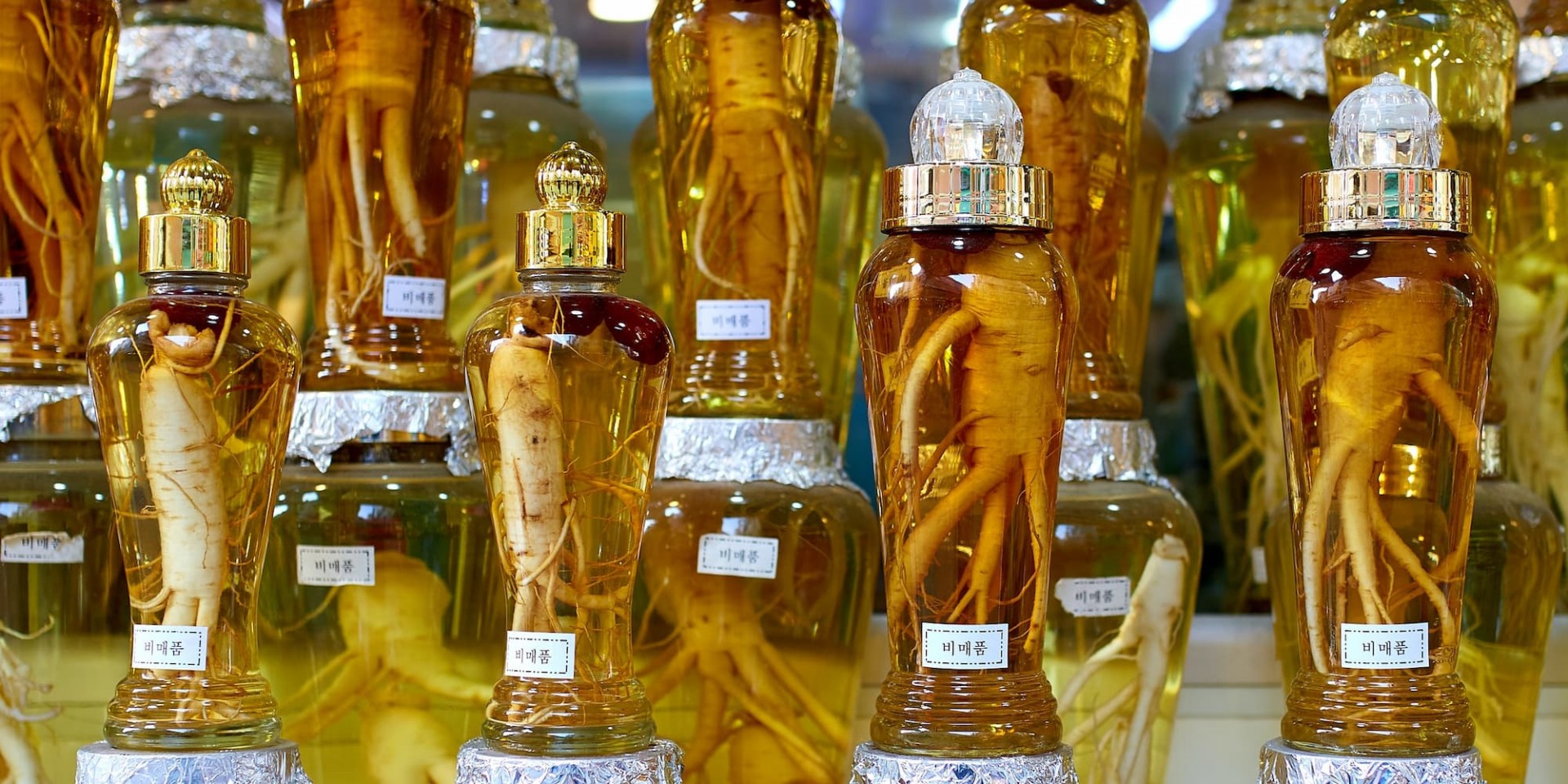
Traditional Chinese herbal medicines contain naturally derived compounds that have been identified for their role in immunological regulation1. Some of these bioactive compounds include flavonoids, saponins, polysaccharides, polyphenols, triterpenoids, alkaloids and amino acids.
Astragalus root (astragalus membranaceus) known as Huang Qi in China, is an adaptogenic herb used for the treatment of general weakness and to increase the vital energy in Traditional Chinese Medicine (TCM)2. It is used as an immune stimulant and tonic with hepato-protectant, diuretic, antidiabetic, anticancer, and expectorant properties3 and has been shown to exhibit immunomodulating4,5, antihyperglycemic6, anti-inflammatory7, antioxidant8, and antiviral activities9 among others. It is recommended for people who suffer from recurrent colds, allergies, general fatigue and body weakness and as a cardiovascular tonic2. The dried root can be purchased in Asian grocery stores and added to anything from soups to congees to boost immunity. Recently, an increasing number of experiments, both in vivo and in vitro, showed that astragalus membranaceus can enhance the body's natural defense mechanisms10-12. In TCM it is used in combination with other herbs, according to your presenting signs and symptoms. To consolidate immunity it should be used for several months as a preventative. The most common formulation in TCM for building vital qi is Yu Ping Feng San (YPFS) or Jade Windscreen Powder: a combination of three herbs with astragalus membranaceus as the largest dose. Scientific research has demonstrated that YPFS could modulate inflammatory response and phagocytosis in exerting anti-viral and anti-bacterial effects13,14. Additionally, YPFS was found to suppress the neuraminidase activity of influenza virus A in cultured epithelial cells, thereby preventing the viral release and spreading13. In summary, phytochemical and pharmacological studies on the main herb, astragalus membranaceus and the formula (YPFS), exerted anti-bacterial, anti-viral, antioxidant, anti-inflammatory and immune response activities15.
Ganoderma lucidum, known as reishi in Japan and Ling Zhi in China, is a member of the fungus family (lamellae basidiomycete of the family Polyporaceae) which naturally grows on decaying trees and logs16. It has a long pharmaceutical and nutraceutical history in Asia and contains several biologically active compounds including beta-glucans, polysaccharides, triterpenoids and ganoderic acids17. Amongst its traditional uses, it is prescribed for calming the spirit, improving sleep quality and supporting immune function2. TCM prescribes ganoderma lucidum (Ling Zhi), in herbal formulae, to strengthen the lungs, stop coughing, vital qi and blood in deficiency conditions, according to the individual’s presenting signs and symptoms. Scientific research of ganoderma lucidum and its compounds have also reported on its anti-tumour activity via enhancement of host immunity via immune-potentiating polysaccharide receptors16. Ganoderma lucidum polysaccharides have also been widely studied as immunomodulator and as inducers of strong immune responses17,18. Intake of ganoderma lucidum is reported to enhance the immune system with an increase in monocytes, macrophages and T-lymphocytes19. Ganoderma lucidum is available in capsule format and can be taken daily to enhance immune function.
Radix Glycyrrhizae et Rhizoma (Gan Cao) is a tonifying herb in the Chinese Pharmacopeia and is commonly known as liquorice root. The main compounds of Radix Glycyrrhizae are flavonoids, alkaloids, triterpenes. Radix Glycyrrhizae is the most frequently used traditional Chinese herb owing to its synergistic effects that enhances the efficacy and reduces the toxicity of other herbs. Radix Glycyrrhizae exhibits various pharmacological effects including antitumor, antibacterial, antiviral, anti-inflammatory, and immune-regulatory activities20,21. In TCM it is prescribed to boost the vital qi and to moisten the lungs and is used in a Chinese herbal formula to stop cough and wheezing, to relieve fatigue and to strengthen immunity2. Studies on Radix Glycyrrhizae have shown the potential of its compounds (particularly polysaccharides) as anticancer and as an immune booster in vitro and in vivo22. Scientific evidence on the immune effects of cell wall-based nanoparticles isolated from boiled Radix Glycyrrhizae was investigated and it was reported that isolated nanoparticles triggered immunostimulatory effects inducing the expression of inflammatory cytokines23. Radix Glycyrrhizae is contra-indicated in pregnancy and for patients with hypertension, congestive heart failure or kidney disease. Long-term use may cause headaches, dizziness, and salt retention2.
It is a good idea to visit your Traditional Chinese Medicine practitioner at the onset of a change of season to boost your health. By enhancing our immunity with herbal medicine, we can optimise our well-being and minimise our risk of infection. Additionally, if you have a cold or influenza, Chinese medicinal herbs may help to shorten the duration and lessen the symptoms. Consult a traditional Chinese medicine practitioner as dosages and herbal formulae can vary depending on individual constitution and presenting symptoms.
References:
- Ma, H.D., Deng, Y.R., Tian, Z. et al. Traditional Chinese Medicine and Immune Regulation. Clinic Rev Allerg Immunol 44, 229–241 (2013). https://doi-org.ezproxy.uws.edu.au/10.1007/s12016-012-8332-0
- Bensky, D. & Barolet, R. Chinese herbal medicine: formulas & Strategies. 1990. Eastland Press. Seattle.
- Chinese Pharmacopoeia Commission. Chemical Industry Press: Beijing, 2010, 283. (in Chinese).
- Bedir, E., Pugh, N., Calis, I., Pasco, D.S., Khan, I.A. (2000). Immunostimulatory Effects of Cycloartane-Type Triterpene Glycosides from Astragalus Species. Biological & Pharmaceutical Bulletin, 23(7), 834-837.
- Wang, Jia, Jia, Junying, Song, Li, Gong, Xue, Xu, Jianping, Yang, Min, & Li, Minhui. (2018). Extraction, Structure, and Pharmacological Activities of Astragalus Polysaccharides. Applied Sciences, 9(1), 122.
- Chan, J.Y.W., Lam, F.C., Leung, P.C., Che, C.T., Fung, K.P. (2009). Antihyperglycemic and antioxidative effects of a herbal formulation of Radix Astragali, Radix Codonopsis and Cortex Lycii in a mouse model of type 2 diabetes mellitus. Phytother Res 23(5):658-665.
- Choi, H.S., Joo, S.J., Yoon, H.S., Kim, K.S., Song, I.G., Min, K.B. (2007). Quality characteristic of hwangki (Astragalus membranaceus) chungkukjang during fermentation. Korean Journal of Food Preservation 14(4):356-363.
- Li, R., Chen, C.W., Wang, P.W., Tian, Y.W., Zhang, G.X. (2010). Antioxidant activity of Astragalus polysaccharides and antitumour activity of the polysaccharides and siRNA. Carbohydr Polymer 82(2): 240-244.
- Zhu, H.Y., Zhang, Y.Y., Ye, G., Li, Z.X., Zhou, P., Huang, C.G.( 2009). In vivo and in vitro antiviral activities of calycosin-7- O-β-D-glucopyranoside against coxsackie virus B3. Biol Pharm Bull 32(1): 68-73.
- Wang, T.R., Shan, B.E., Li, Q.X., et al. (2002). Extracorporeal experimental study on immunomodulatory activity of Astragalus membranaceus extract. Chin J Integr Trad Western Med 22(2): 453-456.
- Block, K.I. Mead, M.N. (2003). Immune system effects of echinacea, ginseng and astragalus: a review. Integr Cancer Ther 2(3): 247-267.
- Tan, B.K.H., Vanitha, J. (2004). Immunomodulatory and antimicrobial effects of some traditional Chinese medicinal herbs: a review. Curr Med Chem 11(11): 1423-1430.
- Du, C, Zheng, K, Bi, C, Dong, T, Lin, H, Tsim, K. Yu Ping Feng San, an Ancient Chinese Herbal Decoction, Induces Gene Expression of Anti-viral Proteins and Inhibits Neuraminidase Activity. Phytotherapy Research. 2015 May; 29(5):656-61. Doi: 10.1002/ptr.5290.
- Song, D.H., Wu, Y. (2001). The progress of clinical application of the Chinese traditional medicine Astragalus membranaceus. Med Recapitulate 7(7): 439-440.
- Fu, Juan, Wang, Zenghui, Huang, Linfang, Zheng, Sihao, Wang, Dongmei, Chen, Shilin, . . . Yang, Shihai. (2014). Review of the Botanical Characteristics, Phytochemistry, and Pharmacology of Astragalus membranaceus (Huangqi). Phytotherapy Research, 28(9), 1275-1283.
- Shao, Bao-Mei, Dai, Hui, Xu, Wen, Lin, Zhi-Bin, & Gao, Xiao-Ming. (2004). Immune receptors for polysaccharides from Ganoderma lucidum. Biochemical and Biophysical Research Communications, 323(1), 133-141.
- Pan, Ke, Jiang, Qunguang, Liu, Guoqing, Miao, Xiongying, & Zhong, Dewu. (2013). Optimization extraction of Ganoderma lucidum polysaccharides and its immunity and antioxidant activities. International Journal of Biological Macromolecules, 55, 301-306.
- Liu, Zhenguang, Xing, Jie, Zheng, Sisi, Bo, Ruonan, Luo, Li, Huang, Yee, . . . Wu, Yi. (2016). Ganoderma lucidum polysaccharides encapsulated in liposome as an adjuvant to promote Th1-bias immune response. Carbohydrate Polymers, 142, 141-148.
- Hem, L.G. van der, Vliet, J.A. van der, Bocken, C.F.M, Kino, K, Hoitsma, A.J, & Tax, W.J.M. (1995). Ling Zhi-8: Studies of a new immunomodulating agent. Transplantation, 60(5), 438-443.
- Yang, Rui, Wang, Li-qiang, Yuan, Bo-chuan, & Liu, Ying. (2015). The Pharmacological Activities of Licorice. Planta Medica, 81(18), 1654-1669.
- Chirumbolo, Salvatore. (2016). Commentary: The antiviral and antimicrobial activities of licorice, a widely used Chinese herb. Frontiers in Microbiology, 7, 531.
- Ayeka, P.A., Bian, Y., Mwitari, P.G. et al. Immunomodulatory and anticancer potential of Gan cao (Glycyrrhiza uralensis Fisch.) polysaccharides by CT-26 colon carcinoma cell growth inhibition and cytokine IL-7 upregulation in vitro. BMC Complement Altern Med 16, 206 (2016). https://doi.org/10.1186/s12906-016-1171-4
- Iitsuka, Hirofumi, Koizumi, Keiichi, Suzaki, Mikiko, Otsuka, Yoshiki, Jo, Michiko, & Shibahara, Naotoshi. (2020). Immunostimulatory effects of cell wall-based nanoparticles in boiled Glycyrrhizae radix water extracts involves TLR4. Biomedical Reports, 12(6), 303-308.










